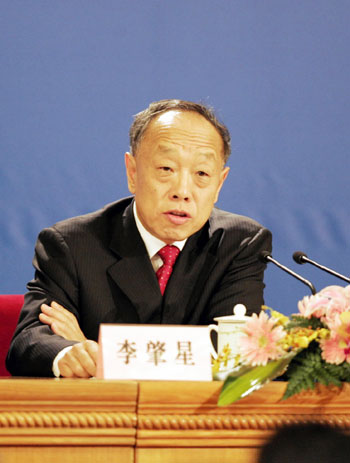|
China urges better ties with U.S.
(AP)
Updated: 2006-03-08 18:58
China's rising economic and political power will benefit — not threaten — its neighbors, Foreign Minister Li Zhaoxing said Tuesday, calling for better ties with Washington and urging Iran to settle the dispute over its nuclear program.

Foreign Minister Li Zhaoxing holds a press conference in the Great Hall of the People on the sidelines of the ongoing session of the National People's Congress in Beijing March 7, 2006. [Xinhua] |
In a televised news conference during the annual session of China's parliament, Li restated China's positions on a wide number of diplomatic issues, from the Middle East to North Korea.
In every case, the message was clear: China is a friendly country eager to work with the rest of the world to resolve issues posing a risk to peace and stability, such as the controversies over nuclear programs in Iran and North Korea.
"China's development does not pose any threat to any countries," Li said. "On the contrary, China's development has provided more and more opportunities to the development of other countries in the world."
Li appealed for more negotiation and for all sides involved in Iran's nuclear dispute to stay calm and work with the International Atomic Energy Agency.
Iran maintains its nuclear program is for generating electricity, while the United States and Europe fear the program may be a cover for efforts to make atomic bombs.
The IAEA is due to meet this week and could set in motion a process to turn the issue over to the U.N. Security Council, which has the power to impose economic and political sanctions.
"Iran should cooperate closely with the IAEA to settle the nuclear dispute," Li said. "There is still room for settlement of the issue in the IAEA."
China, a veto-wielding member of the Security Council, has opposed sanctions against Iran, although it shares the shares the concerns of the United States, France and Britain — also veto-wielding members — that Iran could misuse a uranium enrichment program to make weapons.
Li also emphatically criticized fellow Asian power Japan. Relations between the two have been strained over their wartime history and China's growing military power.
Li repeated Beijing's objections to Japanese Prime Minister Junichiro Koizumi's visits to a war shrine honoring Japanese war dead, including convicted war criminals.
Li described the visits as inexplicably "stupid," and he demanded that Koizumi and other leaders not repeat them.
"Japanese leaders must demonstrate courage and sincerity and correct their mistakes," Li said.
He also called for confidence-building measures from the United States, North Korea and other nations involved in six-party talks on the North's nuclear program. He also vowed to continue pushing for progress.
Washington recently slapped restrictions on a Macau bank and North Korean companies for their alleged complicity in counterfeiting, money laundering and weapons proliferation. Pyongyang says it wants those restrictions lifted before it returns to the nuclear talks last held in Beijing in November.
With President Hu Jintao due to make his first state visit to the United States next month, Li's tone toward Washington was conciliatory.
Despite differences over trade, Taiwan, human rights and other issues, the two sides have extensive shared interests, Li said.
"We are ready to work with the U.S. side to strengthen our mutual understanding, expand our common ground, deepen mutual trust and ... appropriately settle our differences," he said.
Li said China is not keen to expand its trade surplus with the United States, which surged to a record $201.6 billion last year.
He urged the United States not to yield to pressure from congressman who want action from Washington on what they believe are unfair trading practices by China.
He also repeated Beijing's calls for the United States to lift export restrictions that China contends are a major factor behind the chronic trade imbalance.
Trade with China has helped create between 4 million and 8 million jobs in the United States, and inexpensive products made here benefit U.S. consumers, helping keep inflation in check, he contended.
Exports of Chinese-made fake Christmas trees are but one of many benefits of expanded trade, he quipped.
"Perhaps you know that many of the manmade Christmas trees used by American families are made in China. This helps conserve the U.S. environment," Li said.
|